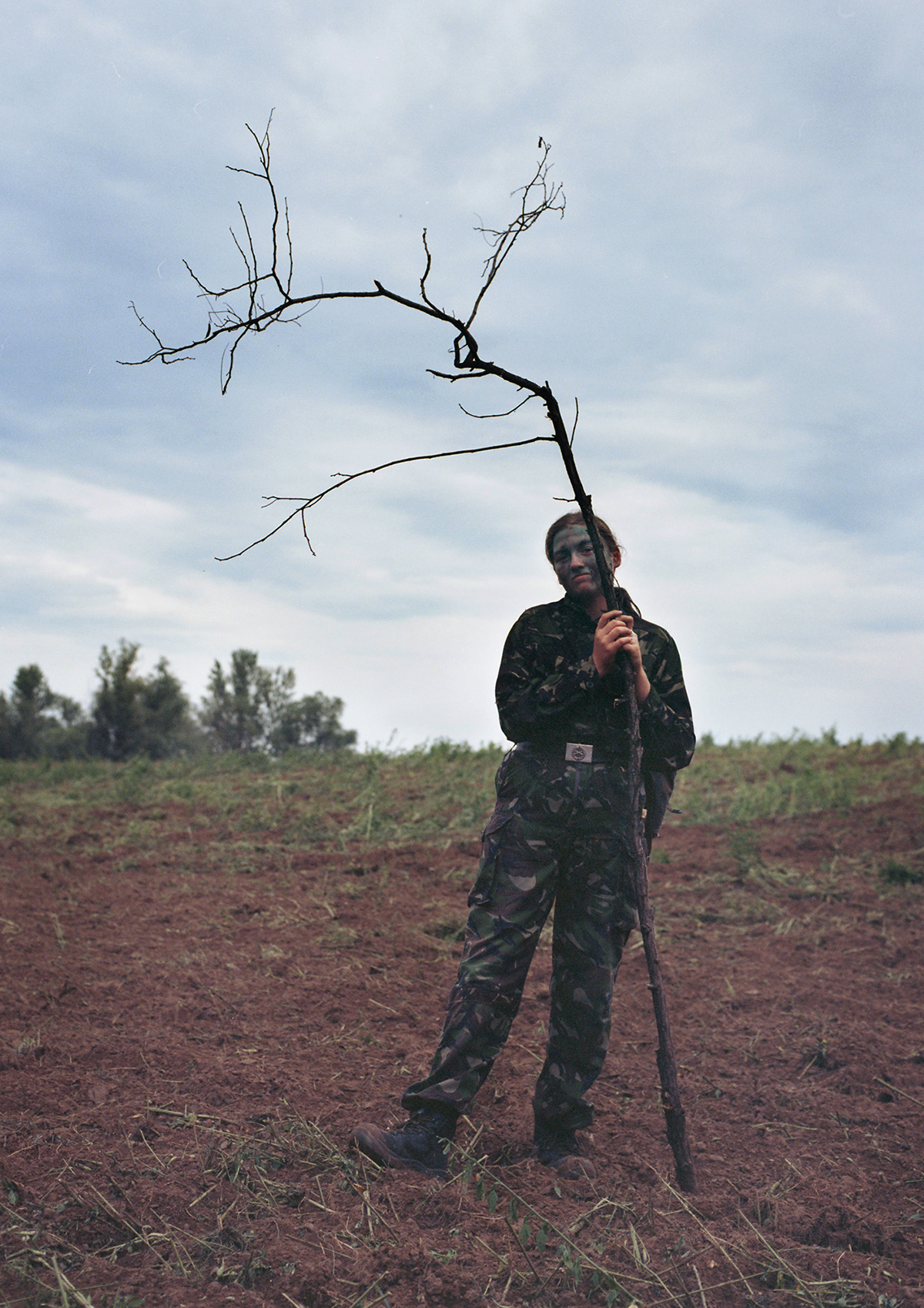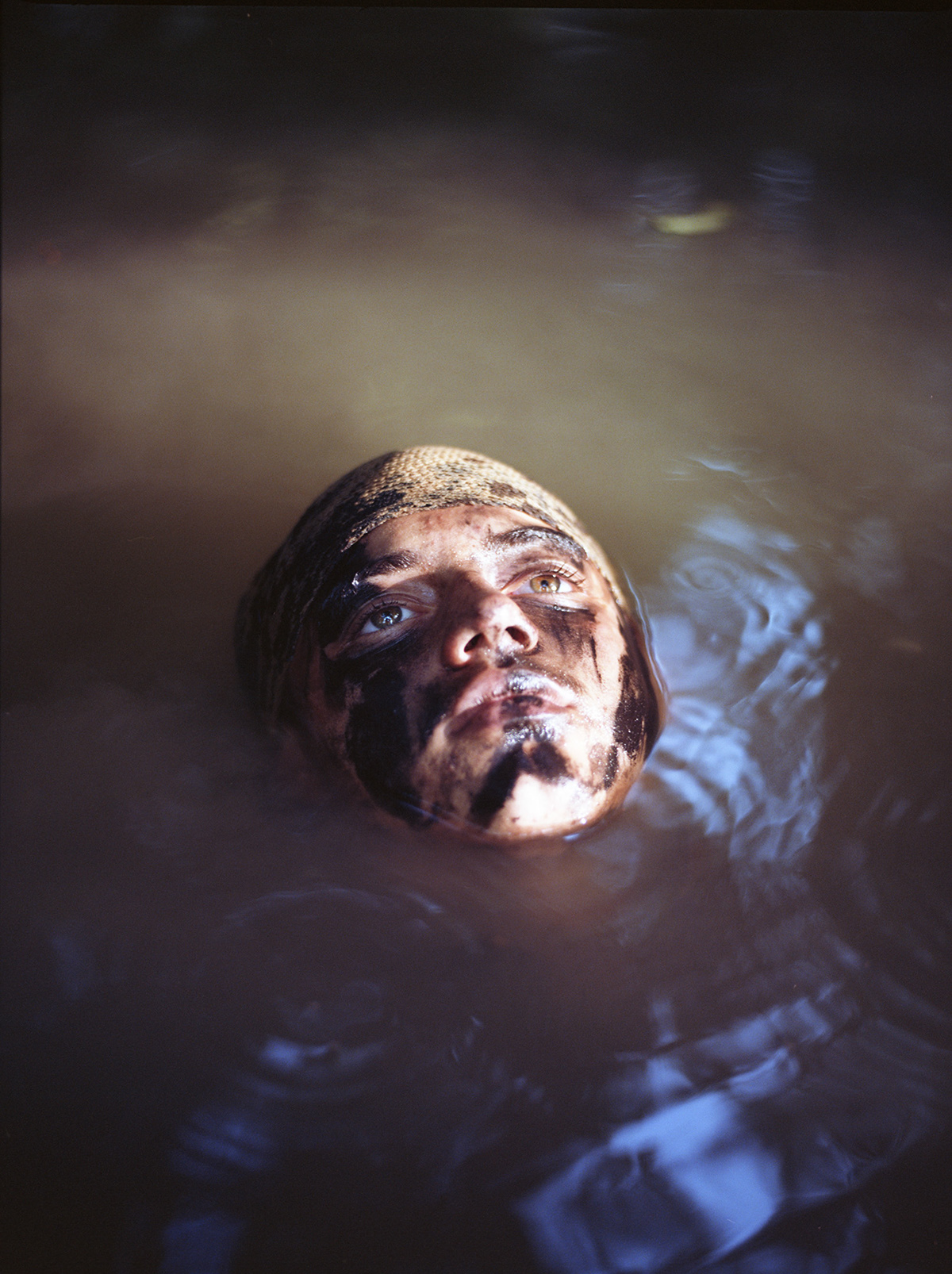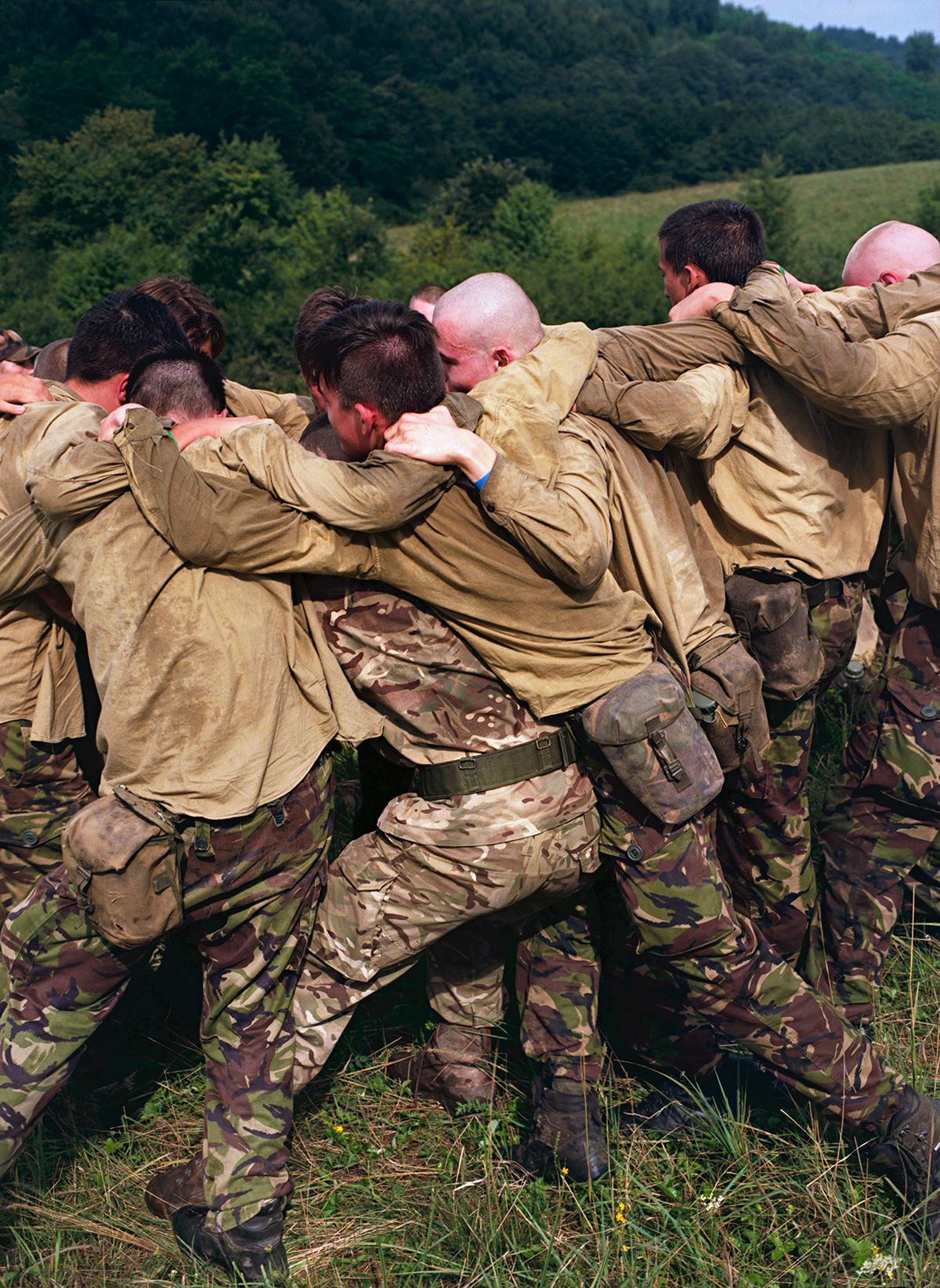
Contact: to touch; the state of physical touching. To connect. In military terminology: meeting the enemy; armed conflict with an opposing force.
After hours of driving, I’d finally arrived at the small village. It was late in the afternoon. A girl, wearing a camouflage outfit was waiting for me. Leaving the main road, we continued towards the depths of the surrounding forest. Commands echoed among the trees as we reached a small clearing. There, between military tents, uniformed children around primary school age were lining up silently. One of them struggled with push-ups, with an officer counting above him. I was led to the canteen tent, where another team was preparing the tables for dinner.
There’s an NGO in Hungary that organizes military-themed free-time activities for children between ages 10 and 18. While ’home defense education’ is becoming an important part of government communication, youth military education, as a phenomenon, is nearly unknown in Hungary. In some other countries of the world, it has a fairly long tradition. The Latin term ‘iuvenes’ or ‘iuventus’ – youth – was used for 14 year- old-Roman boys who had become old enough to start their first military training. The leaders of Honvédsuli [Home Defense School] – a family-support expert and a former French Legion soldier – believe they provide nature-oriented, patriotic, group experience-based education for the youth.
Waking up at dawn, running and doing exercises in the morning cold, followed by the orderly serving of a simple breakfast, which is then cleaned away by a service team. The officers – kids themselves – control the community of 40-50 with confidence: they teach them to line up, or to march on order, and that there’s a punishment for littering, bad language, or for losing a part of their equipment. They learn to use replicas of real-life guns, but most of the time they spend acquiring knowledge about survival in wild nature. The week-long camps culminate in a large-scale war-game where teams fight against each other in the surrounding wilderness. I’d observed this process many times, adopting their daily routine. Every time on the way home, I had the same question in my mind: is it only curiosity that drives me back again and again to this far-away world?
For some, the ban on phone usage or camping itself means heavy physical and mental pressure. The so-called ‘motivational training’, aimed at pushing one’s boundaries may look quite frightening: children creeping in mud or sweating under the sun while being shouted at. Some quit underway, and others decide not to take part at all. Still, around the evening campfire, they’re all proud of telling stories about completing what they could do. And in the meantime, they slowly arrive at the peak of their adolescence, facing responsibilities, freedom, and limits, pain, friendship, and love, perhaps for the first time.
The majority of these kids don’t wear uniforms or deal with home defense outside the camps. Some arrive from military families, but most of them will not take that path later on. Those who were attracted by the love of computer games will change their minds about this matter, exactly because of the hardships they experience in the camps. Others are being sent by desperate parents who feel they have failed at bringing up their children. These kids regularly tell they receive more attention during this one week period than in a year at home. And there are those who arrive from deep cultural and material poverty. For them, this isn’t only an adventurous game, or a community of close friends, but the strongest force shaping their identity. Something, they can be proud of.
The community organizes programmes throughout the year, themed around keeping historic traditions. They regularly take care of neglected war tombs or march for days, singing and wearing First or Second World War Uniforms, to commemorate fallen soldiers in every village they pass. They’re always greeted with hospitality and a warm dinner, lodged for the nights in local school buildings. For many of them, these adventures provide the only solid ground in life, a framework to understand the world and their position in it.
I genuinely fear war, and I have never idealized violence either. The presence of weapons and death as a thought made me uncomfortable in a kids’ camp. But it was an equally surprising and liberating experience to hear about the importance and uniqueness of life in the very same context from them. What I would have labeled at first with terms like ’conservative’ or ’nationalistic’, later seemed hard to place in the coordinate system of today’s popular ideologies. Honvédsuli’s leaders state that their militaristic approach and the challenges they impose are able to demonstrate the importance of effort, the role of community, and the value of simple things such as nature, warm food, or a comfortable bed, in a society becoming ever so slothful. There are always many weeping faces at the camp closing ceremony, as most of them can’t wait to return next year. While I, at the same time, think about what I felt seeing kids with weapons at first, and now, one and a half years later.
Images of violence surround us in the shape of photography, films, toys, and video games. I have come to realize that perhaps for this very reason my standpoint on weapons, war, or home defense is vague. Like the 13-year-old, who’s falling back on the ground over and over again but still is trying hard to climb that muddy rope – the same way I’m trying to refine my approach.
After hours of driving, I’d finally arrived at the small village. It was late in the afternoon. A girl, wearing a camouflage outfit was waiting for me. Leaving the main road, we continued towards the depths of the surrounding forest. Commands echoed among the trees as we reached a small clearing. There, between military tents, uniformed children around primary school age were lining up silently. One of them struggled with push-ups, with an officer counting above him. I was led to the canteen tent, where another team was preparing the tables for dinner.
There’s an NGO in Hungary that organizes military-themed free-time activities for children between ages 10 and 18. While ’home defense education’ is becoming an important part of government communication, youth military education, as a phenomenon, is nearly unknown in Hungary. In some other countries of the world, it has a fairly long tradition. The Latin term ‘iuvenes’ or ‘iuventus’ – youth – was used for 14 year- old-Roman boys who had become old enough to start their first military training. The leaders of Honvédsuli [Home Defense School] – a family-support expert and a former French Legion soldier – believe they provide nature-oriented, patriotic, group experience-based education for the youth.
Waking up at dawn, running and doing exercises in the morning cold, followed by the orderly serving of a simple breakfast, which is then cleaned away by a service team. The officers – kids themselves – control the community of 40-50 with confidence: they teach them to line up, or to march on order, and that there’s a punishment for littering, bad language, or for losing a part of their equipment. They learn to use replicas of real-life guns, but most of the time they spend acquiring knowledge about survival in wild nature. The week-long camps culminate in a large-scale war-game where teams fight against each other in the surrounding wilderness. I’d observed this process many times, adopting their daily routine. Every time on the way home, I had the same question in my mind: is it only curiosity that drives me back again and again to this far-away world?
For some, the ban on phone usage or camping itself means heavy physical and mental pressure. The so-called ‘motivational training’, aimed at pushing one’s boundaries may look quite frightening: children creeping in mud or sweating under the sun while being shouted at. Some quit underway, and others decide not to take part at all. Still, around the evening campfire, they’re all proud of telling stories about completing what they could do. And in the meantime, they slowly arrive at the peak of their adolescence, facing responsibilities, freedom, and limits, pain, friendship, and love, perhaps for the first time.
The majority of these kids don’t wear uniforms or deal with home defense outside the camps. Some arrive from military families, but most of them will not take that path later on. Those who were attracted by the love of computer games will change their minds about this matter, exactly because of the hardships they experience in the camps. Others are being sent by desperate parents who feel they have failed at bringing up their children. These kids regularly tell they receive more attention during this one week period than in a year at home. And there are those who arrive from deep cultural and material poverty. For them, this isn’t only an adventurous game, or a community of close friends, but the strongest force shaping their identity. Something, they can be proud of.
The community organizes programmes throughout the year, themed around keeping historic traditions. They regularly take care of neglected war tombs or march for days, singing and wearing First or Second World War Uniforms, to commemorate fallen soldiers in every village they pass. They’re always greeted with hospitality and a warm dinner, lodged for the nights in local school buildings. For many of them, these adventures provide the only solid ground in life, a framework to understand the world and their position in it.
I genuinely fear war, and I have never idealized violence either. The presence of weapons and death as a thought made me uncomfortable in a kids’ camp. But it was an equally surprising and liberating experience to hear about the importance and uniqueness of life in the very same context from them. What I would have labeled at first with terms like ’conservative’ or ’nationalistic’, later seemed hard to place in the coordinate system of today’s popular ideologies. Honvédsuli’s leaders state that their militaristic approach and the challenges they impose are able to demonstrate the importance of effort, the role of community, and the value of simple things such as nature, warm food, or a comfortable bed, in a society becoming ever so slothful. There are always many weeping faces at the camp closing ceremony, as most of them can’t wait to return next year. While I, at the same time, think about what I felt seeing kids with weapons at first, and now, one and a half years later.
Images of violence surround us in the shape of photography, films, toys, and video games. I have come to realize that perhaps for this very reason my standpoint on weapons, war, or home defense is vague. Like the 13-year-old, who’s falling back on the ground over and over again but still is trying hard to climb that muddy rope – the same way I’m trying to refine my approach.
















































